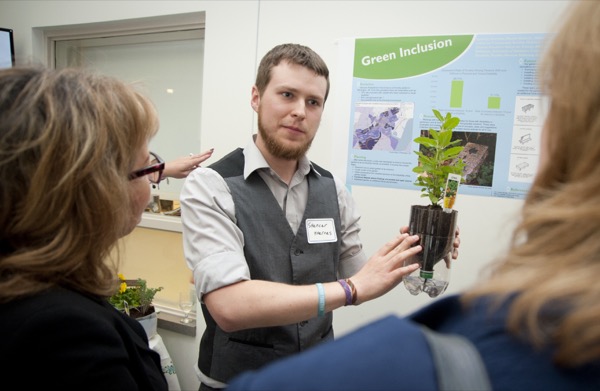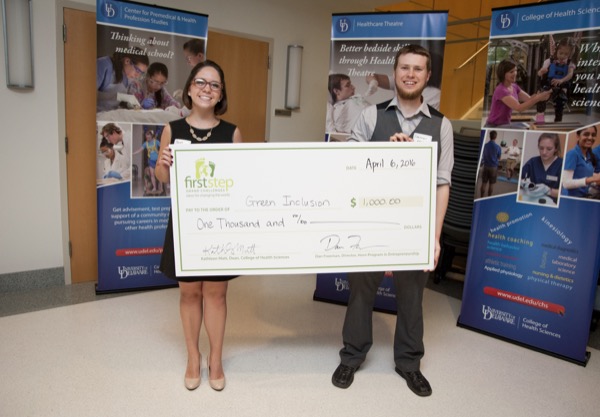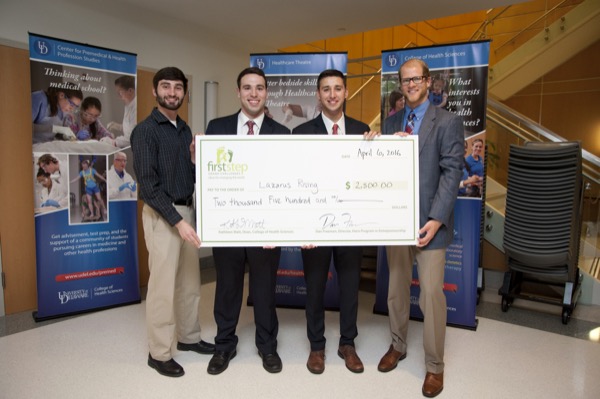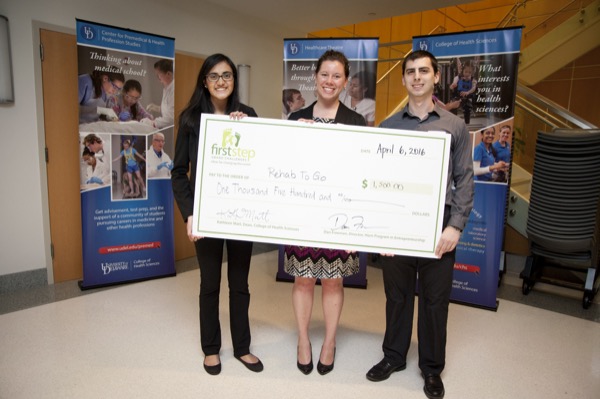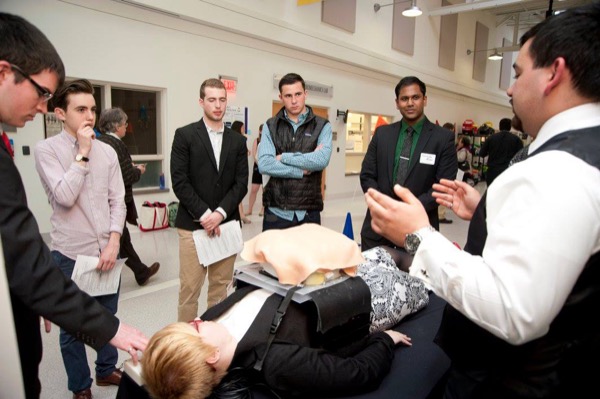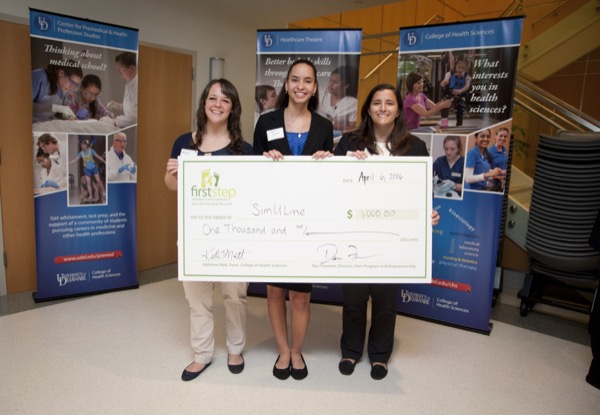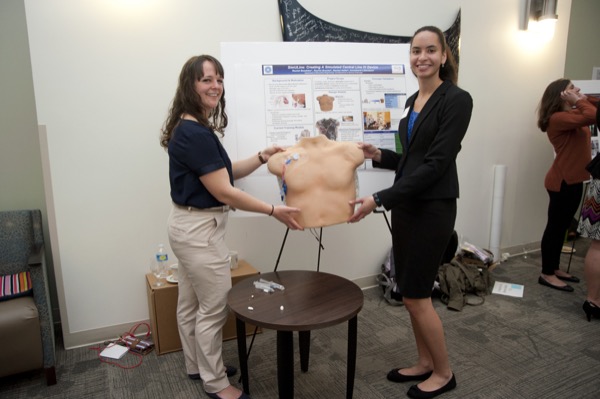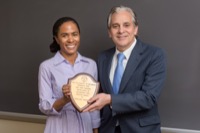

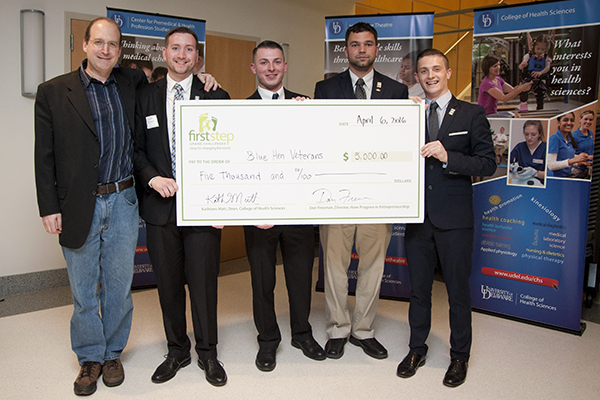
Just the First Step
First Step Grand Challenges awards seed money to six innovative teams
10:34 a.m., April 14, 2016--After a year of brainstorming, roadblocks, ideation and breakthroughs, the 2016 edition of the University of Delaware’s First Step Grand Challenges has drawn to a close – well, sort of. After the yearlong competition ended with a final pitch competition earlier this month, the top undergraduate teams were awarded more than $10,000 in seed money to take their ideas, prototypes and models to the next level.
First Step is a University-wide competition that brings together students from all seven colleges to tackle environmental-, societal- or health-related challenges.
Honors Stories
National Medal of Science
Warren Award
This program was a long undertaking for these Blue Hens, beginning early in the fall semester when approximately 100 undergraduates started forming teams. With more than 30 majors represented, each team received $500 in funding to get started.
They workshopped their ideas with the support of faculty, staff and community partners. The ideas grew from initial concepts to tangible solutions – taking on everything from amputee rehabilitation to diversity to homelessness.
Students said they really enjoyed the interdisciplinary focus of this year’s competition. The EmergenCPR team, which is working on smartphone technology that provides step-by-step CPR instructions during an emergency, included students from an array of academic backgrounds.
“Without this program, I am not sure that we could have combined our areas of expertise to find solutions for CPR training,” said Dylan Buller, a senior philosophy major who plans to attend medical school next year. “First Step Grand Challenges allowed us to take it from step zero to where we are now.”
So after team meetings, workshops, written reports, tons of revisions and practice presentations, the finalists descended on the Health Sciences Complex on UD’s Science, Technology and Advanced Research (STAR) Campus for a final event – a poster presentation and awards dinner.
Standing in front of STAR's backdrop of clinics and research labs, 21 teams pitched their ideas to attendees, which included peers, community members, and First Step’s panel of judges, who were impressed with the variety of projects and creative solutions.
“I was very impressed with the vision, passion and effort put forth by the various teams. Each one was excited to share the work they did, and rightfully proud of what they had accomplished so far,” said Ted Foltyn, a judge and adjunct faculty in UD’s Venture Development Center. “Students demonstrated great creativity in identifying ways to help patients, populations in great need, young adults needing inspiration and other truly meaningful, new ideas.”
Another panelist, Mariane Stefano, who is the senior vice president and chief experience officer at Nemours Children’s Health System, echoed Foltyn’s analysis.
“I was most impressed with the creativity and diversity of the projects. It was nice to see students from all colleges participating,” said Stefano. “The students were well-researched and passionate. Their energy and enthusiasm was contagious making it very difficult to choose a winner.”
But when the awards were announced, six winners shone through. The first-place award, which included $5,000 in seed money, went to Blue Hen Veterans. Including current and former members of the United States military, the team’s unique program brings comprehensive resources to veterans studying in colleges. It aims to create a stronger sense of belonging, reduce dropout rates and assist if a veteran is having suicidal thoughts.
With recent downsizing of the military and a huge influx of veterans studying in colleges across the country, the project has national implications.
“Winning this award is a great achievement for Blue Hen Veterans, but, more importantly, it is a win for future student veterans because they are the ones that will reap the benefits,” said senior Brandon Bristor, a double major in criminal justice and sociology. “I am just so grateful that our ideas will have an immediate impact on the transition of student veterans.”
Lazarus Rising won the second-place award ($2,500 in seed money) for a program model in which student volunteers present workshops at homeless shelters to teach residents job placement skills. With high unemployment rates for the population as a whole, the prospects of finding employment for the homeless are dubious. The students have helped 82 percent of participants find employment.
There were two third-place winners, each earning $1,000 in seed money. The first was SimULine, including nursing and biomedical engineering students. The team created a simulated central line IV device that elevates training beyond the common practice of using mannequins. With the aim of reducing bloodstream infections, the device gives health professionals superior training through a more realistic simulation.
The other third-place winner was Green Inclusion, which aims to make community gardens in low income, high disability neighborhoods accessible. The team started by converting a garden at Lutheran Community Services in Wilmington with projects that include installation of a ramp, new raised beds for easier access, incorporating a braille system for the visually impaired and creating an open source site to share their designs.
The First Step judges also handed out the Innovation Award to Rehab to Go. The team will put its $1,500 in seed money toward testing a device that provides live assessments of walking patterns of amputees. The students hope the device can help combat bad gait habits and potential injuries to a person’s sound side.
But that wasn’t it. This year’s field was so strong that Kathleen Matt, dean of the College of Health Sciences, and Dan Freeman, director of the Horn Program in Entrepreneurship, decided to give seed money to another team, UJIMA Institute Residence Living.
The team impressed the judges with a vision to develop co-curricular living-learning communities on college campuses that are reflective of African-American culture; the team would provide adjustment and coping mechanisms, such as peer-to-peer mentoring, to improve retention and faculty-student interaction.
“UJIMA Institute rated as a high impact project that was well developed with strong merit,” said Matt. “Their focus on students and social justice can have immediate and far-reaching outcomes.”
The competition returns during the 2016-17 academic year. Organizers plan on growing the competition – both in terms of participants and subject areas.
“First Step Grand Challenges has gone from 17 to 100 students in only four years,” says Sarah LaFave, program coordinator in the College of Health Sciences. “We want to see an even greater variety of majors participate when we launch First Step again in the fall.”
First Step Grand Challenges is co-sponsored by the College of Health Sciences and the Horn Programs in Entrepreneurship.
Article by Dante LaPenta
Photos by Wenbo Fan




